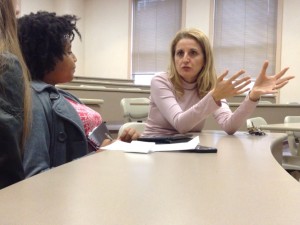On Wednesday, October 29, my group and I scheduled to interview Dr. Yelda Balkir. Dr. Balkir is the Director of Environmental Science at Manhattan College, in Riverdale.
Her office is in one of the buildings in the Manhattan College complex. We asked her about 15 questions related to the topics of coral reef bleaching and destruction, overfishing, and water pollution. I was mainly focused as to her discussion of water pollution, as that’s what I’m mainly focused on. She talked a lot about how we were unwittingly polluting our city water system. She gave the specific example that: “people take anti-biotics, and then they don’t finish their medicine, and they just dump [it] into the water system.” She gave many examples of how drugs are getting into the water system, and we are accidentally take little bits of, for example, antidepressants. If we take a little, it doesn’t affect us, but if we keep on drinking the same polluted water over 40 years, there could be health effects. She also talked about how plastic bags and other trash were getting into the ocean, and how it is negatively effecting fish ecosystems.
She also said many helpful things about coral reef bleaching and destruction. She talked about how coral reefs house many fish, and are important to the underwater ecosystem. She said that they should have a healthy green color from the algae. There are two reasons that coral reef bleaching is happening. The first is that the waters warming is causing the algae to die, and this causes the coral becomes a white bleached color. The second is pollution, and that when pollution levels go up, then so does the amount of coral bleaching.
She also talked about overfishing. She told us about “tragedy of commons”. She gave the example that if you have a fishing village with 10 people, and then over the years these people make a good profit, and catch good fish, then 20 more people come, and decide to fish there, because there are no regulations. Then over the years more and more people come, and eventually there is no fish left. This is abusing the ecosystem, and is a tragedy of commons. Places where there is no fish left, like this example, are called dead zones, and are happening in places like Maryland and the Chesapeake Bay. After the interview, she did one last favor by directing us to two websites that could help us. One was Riverkeeper, a group that helps clean water and rivers in New York. The other was the Hudson River Conservation, a group that works with, as their name suggests, the Hudson River.






